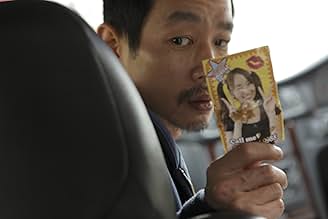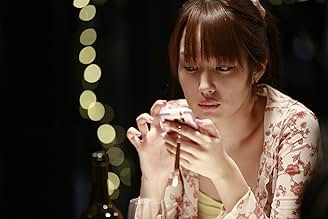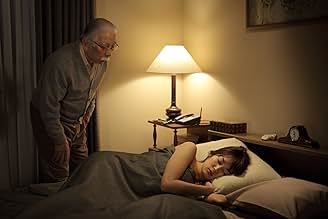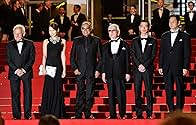In Tokyo, a young sex worker develops an unexpected connection with a widower over a period of two days.In Tokyo, a young sex worker develops an unexpected connection with a widower over a period of two days.In Tokyo, a young sex worker develops an unexpected connection with a widower over a period of two days.
- Director
- Writers
- Stars
- Awards
- 1 win & 6 nominations total
Kôichi Ôhori
- Taxi Driver
- (as Kouichi Ohori)
Ryota Nakanishi
- Student
- (uncredited)
- Director
- Writers
- All cast & crew
- Production, box office & more at IMDbPro
Featured reviews
10mkian
I watched this movie on silver screen twice up to now and I'm sure I can check it out ten more times and still enjoy it. It's definitely a minimal piece of art but it's as deep as life. It looks simple but it doesn't mean you can't elaborate. Kiarostami highlights lifelike stories. Stories which belong to us, ordinary people! Aren't they important? And Kiarostami doesn't conceal this fact that he likes Haiku and Japanese culture but he doesn't have any idea how this feelings came up to him. He started writing poems that resembled Haiku when he was just 20! The serene, nonchalant, and often profoundly philosophical language of haiku allows the poet to swiftly touch on the core of the universal human condition: love, despair, humor, death; as his movies do and now Kiarostami made his last movie (and one of the best ones) where Haiku was blossomed: Japan. All these said, I can't ignore the innovative cinematographic techniques he used in "Like Someone in Love" that adds to the beauty of this movie. Remember the first scene in the bar with Camera fixed on a table, the girl is talking in behind while we see other people activities. We don't know what we should track. The other scenes in the car which camera plays with lights and shadows are just magnificent. I'm really amazed how delicately he sets up these all. Every detail is deliberated. Briefly, if you are bored of the stupid stories we see in the movies nowadays and instead want to know what's behind go and check this out.
This is one of the very few good films I have watched in a while. This film is criticised for being simple, but Kiarostami's craft is almost flawless and very realistic. There are times when I questioned the duration of real-time in the film as he opt not to use jump cuts to show the shift in time, but except that minor glitch, this film was highly tense, deep and meaningful at so many levels.
Unlike the superficial Hollywood garbage we get to see everyday, Kiarostami's films show us real people with real problems. Probably one of the very few directors who can claim to have real class in this present era. I started watching this film after reading an interview with the director. The film did not disappoint me even a little bit. I am ashamed that I did not come across his name before.
Unlike the superficial Hollywood garbage we get to see everyday, Kiarostami's films show us real people with real problems. Probably one of the very few directors who can claim to have real class in this present era. I started watching this film after reading an interview with the director. The film did not disappoint me even a little bit. I am ashamed that I did not come across his name before.
In Tokyo, a young prostitute (Rin Takanashi) develops an unexpected connection with a widower (Tadashi Okuno) over a period of two days.
At this point in his career, Abbas Kiarostami had been directing films for forty years, so he is no amateur. But it might be a bit of a new beginning, filming in Tokyo with an all-Japanese cast. In fact, had one not known better, they might assume the director was Japanese. What do these two worldviews create when blended?
Professor Nico Baumbach makes much of this cultural difference (and rightfully so), saying Kiarostami's foreign immersion "heightens in a new way the sense of the filmmaker as spectator", but is then quick to point out that despite this, we are not alienated from our subjects. The experience of distance "becomes the condition for an emotional connection that otherwise would not have been possible."
The film is also, in short, beautifully shot, with glorious cinematography. This is the sort of film, with its style and charismatic lead actress that one could watch for hours regardless of plot or substance. Critic David Denby says it more eloquently when he writes, "The cinematography is clear and hard-focused, and the editing produces long, flowing passages. This exquisitely made, elusive film has a lulling rhythm and a melancholy charm."
At this point in his career, Abbas Kiarostami had been directing films for forty years, so he is no amateur. But it might be a bit of a new beginning, filming in Tokyo with an all-Japanese cast. In fact, had one not known better, they might assume the director was Japanese. What do these two worldviews create when blended?
Professor Nico Baumbach makes much of this cultural difference (and rightfully so), saying Kiarostami's foreign immersion "heightens in a new way the sense of the filmmaker as spectator", but is then quick to point out that despite this, we are not alienated from our subjects. The experience of distance "becomes the condition for an emotional connection that otherwise would not have been possible."
The film is also, in short, beautifully shot, with glorious cinematography. This is the sort of film, with its style and charismatic lead actress that one could watch for hours regardless of plot or substance. Critic David Denby says it more eloquently when he writes, "The cinematography is clear and hard-focused, and the editing produces long, flowing passages. This exquisitely made, elusive film has a lulling rhythm and a melancholy charm."
A vignette of some pretty sad people whose lives intersect in awkward ways over the course of a day. There's an escort/prostitute (Rin Takanashi), who isn't able to see the grandmother who's made a special trip to Tokyo to meet her, because she's going off to meet a client old enough to be her grandfather (Tadashi Okuno). He's a widower who used to teach, and struggles to get her to do the things he planned - drink some wine, eat the food he prepared, and talk - as instead she just wants to go to sleep. Then there's her troubled boyfriend (Ryo Kase), a guy who's in love with her but senses her distance and suspects she's up to something, heightening his jealousy and clinginess. He actually meets the older man the following day and assumes he's her grandfather, resulting in a strained conversation where he gets some advice. Even the nosy neighbor (Mihiko Suzuki) tells of how her love was unrequited and she's now cooped up, caring for her disabled brother.
They're all a bit broken, each in their own way, and yet Kiarostami allows each to engage in thoughtful dialogue that shows their humanity, and that they're not simply objects of pity. It's in those moments that I liked the film the most. I have to say, though, that its quiet style lagged a bit as it played out, and the ending was rather abrupt and unresolved. The quality of the filmmaking was high, and I could really feel myself on the streets of Tokyo at night and in the heads of these people, but the story wasn't particularly compelling to me, so I was left feeling it was a near miss.
They're all a bit broken, each in their own way, and yet Kiarostami allows each to engage in thoughtful dialogue that shows their humanity, and that they're not simply objects of pity. It's in those moments that I liked the film the most. I have to say, though, that its quiet style lagged a bit as it played out, and the ending was rather abrupt and unresolved. The quality of the filmmaking was high, and I could really feel myself on the streets of Tokyo at night and in the heads of these people, but the story wasn't particularly compelling to me, so I was left feeling it was a near miss.
Like Someone in Love (2012) is a Japanese movie written and directed by the great Iranian filmmaker Abbas Kiarostami. Kiarostami brings his quiet, thoughtful style to a culture that is surely very alien to him. Japanese viewers may note cultural errors in the movie. My thought is that Kiarostami can look beyond cultural differences to universal themes.
The movie, set in Tokyo, stars Rin Takanashi as Akiko, a young provincial woman who is a call girl. (She doesn't walk the streets. She works out of a bar, whose owner arranges the sessions at people's homes.) As the movie opens Akiko is facing two immediate problems. Her jealous boyfriend is on the phone, demanding to know where she is. Akiko is a college student, and her boyfriend is aware of that. He doesn't know that she's a prostitute, but he can sense that something isn't right, and he suspects her of cheating.
Akiko's grandmother is visiting Tokyo that day, and desperately wants to see Akiko. Akiko would love to meet with her, but the bar owner is adamant--she must go out on a call to an important client. The client is Professor Takashi Watanabe, played by Tadasi Okuno. Akiko has no choice but to ignore her grandmother and visit the professor's apartment.
Prof. Watanabe is a gentle, lonely widower. He has prepared a special dinner for Akiko, and he's playing Western music. (It's Ella Fitzgerald singing "Like Someone in Love.") It's more like a seduction scene than a paid sexual encounter.
Akiko spends the night at the professor's home, and he drives her to the university the next morning. It's at that point that the film takes a different turn, because Akiko's violent boyfriend confronts her on the university steps.
All of this action takes place in the first third of the movie. In the remainder of the film, Kiarostami continues to explore this unusual and somewhat threatening love triangle. This interaction among three very different individuals provides a fascinating look into human relationships. Where these relationships will lead isn't always obvious or predictable.
I enjoyed this intelligent, thought-provoking movie. It will work well on DVD. It's worth seeking out and watching.
The movie, set in Tokyo, stars Rin Takanashi as Akiko, a young provincial woman who is a call girl. (She doesn't walk the streets. She works out of a bar, whose owner arranges the sessions at people's homes.) As the movie opens Akiko is facing two immediate problems. Her jealous boyfriend is on the phone, demanding to know where she is. Akiko is a college student, and her boyfriend is aware of that. He doesn't know that she's a prostitute, but he can sense that something isn't right, and he suspects her of cheating.
Akiko's grandmother is visiting Tokyo that day, and desperately wants to see Akiko. Akiko would love to meet with her, but the bar owner is adamant--she must go out on a call to an important client. The client is Professor Takashi Watanabe, played by Tadasi Okuno. Akiko has no choice but to ignore her grandmother and visit the professor's apartment.
Prof. Watanabe is a gentle, lonely widower. He has prepared a special dinner for Akiko, and he's playing Western music. (It's Ella Fitzgerald singing "Like Someone in Love.") It's more like a seduction scene than a paid sexual encounter.
Akiko spends the night at the professor's home, and he drives her to the university the next morning. It's at that point that the film takes a different turn, because Akiko's violent boyfriend confronts her on the university steps.
All of this action takes place in the first third of the movie. In the remainder of the film, Kiarostami continues to explore this unusual and somewhat threatening love triangle. This interaction among three very different individuals provides a fascinating look into human relationships. Where these relationships will lead isn't always obvious or predictable.
I enjoyed this intelligent, thought-provoking movie. It will work well on DVD. It's worth seeking out and watching.
Did you know
- TriviaIn the late 1990s Abbas Kiarostami was driving late at night while on a visit to Tokyo and witnessed a young girl on the side of the street dressed as a bride. In the years following, while visiting Tokyo to promote other films, he realized that he was always looking for that same girl because she had left such an impression but that he would never likely notice her again in real life because she wouldn't be wearing the same dress. This experience became the basis for the film.
- ConnectionsFeatured in At the Movies: Cannes Film Festival 2012 (2012)
- How long is Like Someone in Love?Powered by Alexa
Details
- Release date
- Countries of origin
- Official sites
- Language
- Also known as
- The End
- Filming locations
- Shizuoka, Japan(Shizuoka Station)
- Production companies
- See more company credits at IMDbPro
Box office
- Gross US & Canada
- $239,056
- Opening weekend US & Canada
- $21,813
- Feb 17, 2013
- Gross worldwide
- $562,878
- Runtime1 hour 49 minutes
- Color
- Sound mix
- Aspect ratio
- 1.66 : 1
Contribute to this page
Suggest an edit or add missing content





























